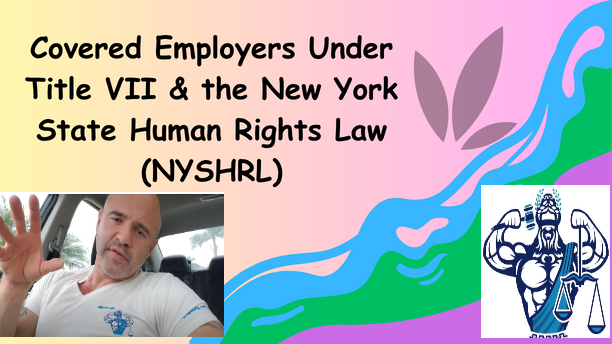Here at the Law Office of Vincent Miletti, Esq. and the home of the #UnusuallyMotivated movement, we take pride as a resilient and dependable legal services firm, providing such services in both a traditional and online, web-based environment. With mastered specialization in areas such as Employment and Labor Law, Intellectual Property (IP) (trademark, copyright, patent), Entertainment Law, and e-Commerce (Supply Chain, Distribution, Fulfillment, Standard Legal & Regulatory), we provide a range of legal services including, but not limited to traditional legal representation (litigation, mediation, arbitration, opinion letters, and advisory), non-litigated business legal representation and legal counsel, and unique, online legal services such as smart forms, mobile training, legal marketing, and development.
Still, here at Miletti Law®, we feel obligated to enlighten, educate, and create awareness about how these issues and many others affect our unusually motivated® readers and/or their businesses. Accordingly, to achieve this goal, we have committed ourselves to create authoritative, trustworthy, & distinctive content. Usually, this content is featured as videos posted on our YouTube Channel https://www.youtube.com/channel/UCtvUryqkkMAJLwrLu2BBt6w and blogs that are published on our website WWW.MILETTILAW.COM. With that, the ball is in your court and you have an effortless obligation to subscribe to the channel and sign up for the Newsletter on the website, which encompasses the best way to ensure that you stay in the loop and feel the positive impact of the knowledge bombs that we drop here!
As the authoritative force in Employment Law, it only seemed right to introduce one of the many upcoming series where we remain persistent in introducing a variety of topics, which will look to not only educate but also deliver in a sense that only Miletti Law® can. In this regard, this blog is Part V of our ongoing miniseries on the “Fundamentals of Trademarks,” where a number of continuing blogs have been dedicated to exploring trademarks in detail & depth. In Part IV and our blog titled “Acquiescence – The First Limitation on Trademark Protection,” we hammered on the concept of “acquiescence” and mentioned that acquiescence arises when an individual knowingly watches as another person infringes on their right but raises no objection, while, at the same time, another individual acts contrary to their rights without malice aforethought and knowledge. We also added that the acquiescence of a trademark’s owner to the use of its mark by a defendant is often considered an affirmative defense to a dispute on trademark and infringement issues on such marks. It is also worth noting the three elements of an acquiescence defense, which comprise things a plaintiff must convince and demonstrate in a court. To move this discussion forward, we have hammered on “laches,” the second limitation on trademark protection in this blog and Part V of the miniseries.
Laches – The Second Limitation on Trademark Protection
By definition, laches is a doctrine or defense on equity that individuals will not be entitled to bringing an action in a court of law if they delayed too long to assert an equitable right. Thus, it implies a lack of activity and diligence in making a legal claim concerning a given matter or asserting a legal right or privilege.
In the U.S., the Trademark Act of 1946, also known as the Lanham Act, is the federal statute that governs unfair competition, service marks, and trademarks. It turns out that there is no statute of limitations for trademark infringement provided under the Lanham Act, which took effect on July 5, 1947. However, pursuant to 15 U.S.C. § 1115(b)(9), the fact that laches is a defense to a claim on trademark infringement is expressly provided by the Lanham Act. Essentially, the laches defense comprises of two elements:
- The delay in making a legal claim on the part of the plaintiff was unreasonable-and-
- The defendant suffered prejudice as a result of the delay (evidentiary prejudice and/or expectations-based prejudice).
It is worth noting that both prospective injunctive relief and monetary damages may be awarded following the establishment of laches in a legal suit.
In the next blog and Part VI of the series, we shall move forward to “Fair Use,” the third “Limitation on Trademark Protection,” and hammer on both “Nominative Fair Use” and “Descriptive Fair Use.”
Stay tuned for more legal guidance, training, and education. In the interim, if there are any questions or comments, please let us know at the Contact Us page!
Always rising above the bar,
Isaac T.,
Legal Writer & Author.
 314-648-2586
314-648-2586 CALL US NOW
CALL US NOW







